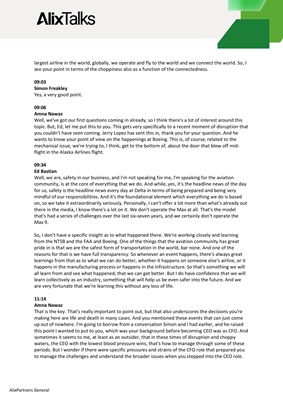
"What will this mean for my company? What will this mean for my industry? And how do I
thoughtfully, planfully," and as Michael says, at speed in some industries, "work out what this means
for me? What does it require by way of investment? How should I be prioritizing my investment and
maybe de-emphasizing other things? Is my boardroom fit for purpose in this respect? Can they ask
me the type of questions to challenge me on whether I'm taking the right steps or not?" I think there
are profound and multiple questions that people are dealing with, knowing that they will have to
work out what this means for them. How will they capitalize on the opportunity, how will they
defend themselves against the risk?
08:38
Amna Nawaz
I love this analogy of an asteroid sort off in the distance heading towards us, because I think for
many of us, it did feel that way. There was a conversation about, "This is coming, this is coming" and
as you say now, it is here. So, let's talk about where we are in this AI revolution and how the timeline
sort of moves from here. In both of your views, Simon, I want to put to you some really striking
numbers. I saw in the latest AlixPartners survey of CEOs worried, basically that their companies
aren't adapting fast enough - some 75% said that they had that concern. 85% of those CEOs said
they don't even know where to start. So how do you begin those conversations?
I know Michael mentioned that it is, of course, industry specific, but in talking to business leaders
about those, they're concerned they're not moving fast enough, but also not knowing where to start.
Where do those conversations begin right now?
09:32
Simon Freakley
Well, it's such a great question, because I think one of the challenges for business leaders around the
world is that it is not just that there's one big disruption or challenge, there are multiple disruptions
and challenges which are layering on top of each other, turning a rolling sea into a choppy sea. It's
almost overwhelming for people and we see this in the disruption index findings. Of course, we saw,
talking about statistics, we saw a 20 point jump in CEO anxiety about whether they'd be able to hang
onto their jobs or not. They feel so overwhelmed by these disruptions. When we hit COVID in 2020,
we thought this was the profound disruption of our time, since which we've had the tragic situation
in Ukraine, the extraordinary challenging situation in the Middle East, and now, of course, generative
AI as well. Different in character, but profound challenges and disruptions at every level.
So, I think the CEOs are feeling overwhelmed. They thought they were in the hot seat, but now find
they're potentially in the ejector seat. The average tenure of S&P 500 CEOs now is under five years.
And so, the challenge for leaders to lead through this time of profound disruption is probably the
greatest it's ever been. But back to AI and generative AI, this is something that is not just a once in a
lifetime transition, but probably in the history of technology, the most profound disruption that
we've seen so far. But again, every one of these technological moments has both opportunity and
threat in it. So, every executive is thinking, well, "Where is the opportunity for me? Where is the
threat to me in this?"
One practical example is what does it mean for the future of employment. Of course, there is much
speculation that generative AI will displace in a profound way employment as we understand it. My
own view, and certainly talking with business leaders, our clients, is that it'll redistribute jobs rather
than replace jobs. A practical example, of course, is back in 1994, nobody could have imagined that